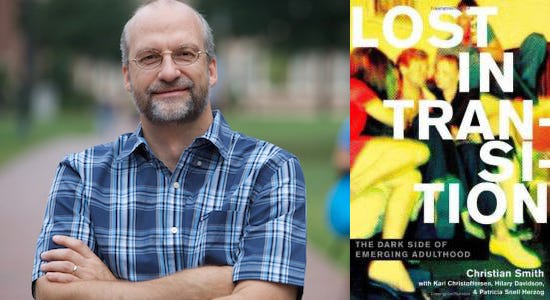Lost in Transition
David Brooks writes in The New York Times this week about an all-too-depressing reality: the lack of critical thinking employed by American young people. Quoting from Lost in Transition: The Dark Side of Emerging Adulthood, the new book from notable Notre Dame sociologist, Christian Smith, Brooks argues:
"In most times and in most places, the group was seen to be the essential moral unit. A shared religion defined rules and practices. Cultures structured people’s imaginations and imposed moral disciplines. But now more people are led to assume that the free-floating individual is the essential moral unit. Morality was once revealed, inherited and shared, but now it’s thought of as something that emerges in the privacy of your own heart."
He's right in his analysis. Some more excerpts:
"It’s not so much that these young Americans are living lives of sin and debauchery, at least no more than you’d expect from 18- to 23-year-olds. What’s disheartening is how bad they are at thinking and talking about moral issues."
“'Not many of them have previously given much or any thought to many of the kinds of questions about morality that we asked,'” Smith and his co-authors write. When asked about wrong or evil, they could generally agree that rape and murder are wrong. But, aside from these extreme cases, moral thinking didn’t enter the picture, even when considering things like drunken driving, cheating in school or cheating on a partner. 'I don’t really deal with right and wrong that often,' is how one interviewee put it."
"Smith and company found an atmosphere of extreme moral individualism — of relativism and nonjudgmentalism. Again, this doesn’t mean that America’s young people are immoral. Far from it. But, Smith and company emphasize, they have not been given the resources — by schools, institutions and families — to cultivate their moral intuitions, to think more broadly about moral obligations, to check behaviors that may be degrading. In this way, the study says more about adult America than youthful America."
"For decades, writers from different perspectives have been warning about the erosion of shared moral frameworks and the rise of an easygoing moral individualism. Allan Bloom and Gertrude Himmelfarb warned that sturdy virtues are being diluted into shallow values. Alasdair MacIntyre has written about emotivism, the idea that it’s impossible to secure moral agreement in our culture because all judgments are based on how we feel at the moment. Charles Taylor has argued that morals have become separated from moral sources. People are less likely to feel embedded on a moral landscape that transcends self. James Davison Hunter wrote a book called The Death of Character. Smith’s interviewees are living, breathing examples of the trends these writers have described."
The point is students are not being taught what moral categories are, let alone trained how to use them to organize moral (or immoral, or amoral) ideas, behaviors, and philosophies. It's like trying to sort the mail without slotted boxes...or trying to find something on the Internet without a search engine...or trying to chart a travel route with only an address but no map on which to plot it. The result is personal confusion, misdirection, and (ultimately) hurt - not to mention a society crumbling due to its inability to discern right from wrong because we are unable to name or describe either.
Many argue that education is the solution, but the claim needs more specificity to be even partially true. In reality, education that helps students recognize and contextualize ideas, behaviors, and philosophies is only part of the solution (and even then it is the foundation - not the pinnacle - of moral formation).




